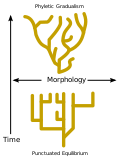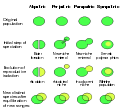Portal:Evolutionary biology
Introduction
Selected article - The evolutionary history of snake venom is a matter of debate. Historically, snake venom was believed to have evolved once, at the base of the Caenophidia, or derived snakes. Molecular studies published beginning in 2006 suggested that venom originated just once among a putative clade of reptiles, called Toxicofera, approximately 170 million years ago. Under this hypothesis, the original toxicoferan venom was a very simple set of proteins that were assembled in a pair of glands. Subsequently, this set of proteins diversified in the various lineages of toxicoferans, including Serpentes, Anguimorpha, and Iguania: several snake lineages also lost the ability to produce venom. The Toxicoferan hypothesis was challenged by studies in the mid-2010s, including a 2015 study which found that venom proteins had homologs in many other tissues in the Burmese python. The study therefore suggested that venom had evolved independently in different reptile lineages, including once in the Caenophid snakes. Venom containing most extant toxin families is believed to have been present in the last common ancestor of the Caenophidia: these toxins subsequently underwent tremendous diversification, accompanied by changes in the morphology of venom glands and delivery systems. (Full article...) General images -The following are images from various evolutionary biology-related articles on Wikipedia.
Selected picture - Tarbosaurus at the Naturkundemuseum Münster in Münster, Germany. Did you know... -
CategoriesRelated portalsTasks you can do
Related topicsWikiProjectsWikiProjects connected with biology: A complete list of scientific WikiProjects can be found here. See also Wikispecies, a Wikimedia project dedicated to classification of biological species. Associated WikimediaDiscover Wikipedia using portals
|
























![Image 24A covalent adduct between the metabolite of benzo[a]pyrene, the major mutagen in tobacco smoke, and DNA (from Mutation)](https://upload.wikimedia.org/wikipedia/commons/thumb/d/d8/Benzopyrene_DNA_adduct_1JDG.png/120px-Benzopyrene_DNA_adduct_1JDG.png)















